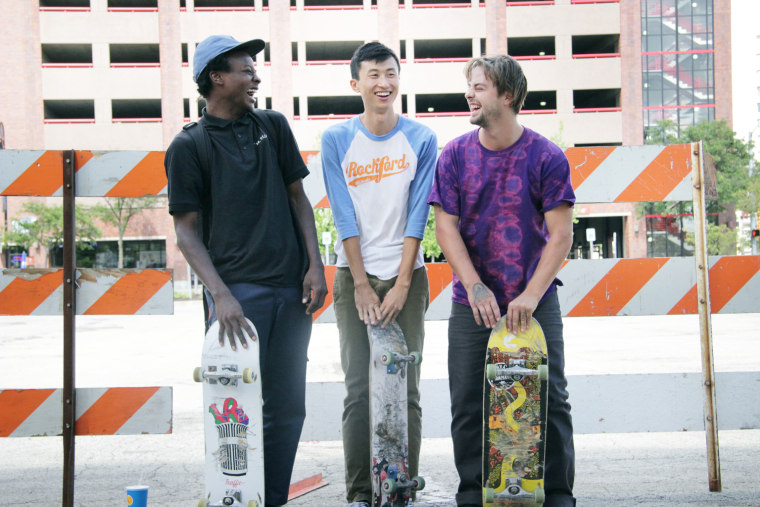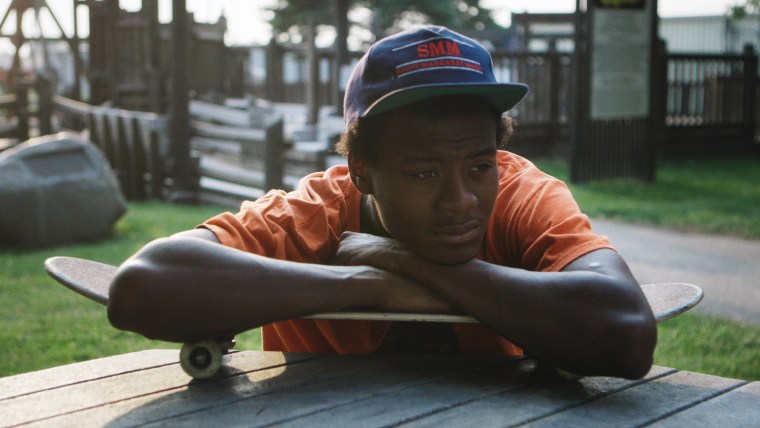 Minding The Gap's Keire Johnson, Bing Liu, and Zack Mulligan.
Minding The Gap's Keire Johnson, Bing Liu, and Zack Mulligan.
Minding The Gap is a movie that takes you by surprise. Director Bing Liu’s documentary starts out small, capturing the camaraderie and tricks of a small group of skaters in Rockford, Illinois. Slowly, however, Liu reveals a painful theme of domestic abuse, from that experienced by his friend Keire at the hands of his father to his own abuse by a violent stepfather — as well as his friend Zack, who Liu learns has been abusive toward his girlfriend. What follows is a deep examination of masculinity, race, class, and the redemptive power of subcultures.
The documentary offers a window into private experiences while highlighting a nationwide problem; according to 2017 figures from the American SPCC, 1,720 children died from abuse and neglect in that year. In a particularly wrenching scene, Liu asks Keire — a teenager who loves skating and the indie rock band Foxing — why he keeps skating when it regularly hurts him. “Well, I mean, so did my father, and I still love him,” he says.
Minding The Gap is one of five films nominated for the Best Documentary Film award at this year’s Oscars. Speaking over the phone a week before the ceremony, Liu said he was “in bed with the flu, watching Brooklyn Nine-Nine” when he heard about his nomination; even though he knows it's “a notch on my belt for the rest of my career,” he admits to feeling cold toward the self-promo that comes with awards season. “I’ve been burned out and feeling like, ‘Is this what it is to be a filmmaker? Shaking hands and kissing babies,’" he laughs. “It’s been one of the craziest months of my life.” Read on for Liu’s story of everything that led up to that moment.
Minding The Gap was shot over the course of a decade-plus. Tell me about the early stages of making the movie. What was it that first inspired you to pick up a camera?
I met some videographers who came to Rockford from Chicago and loved what they did. They made these videos that were so artsy, and I wanted to do that too. I was 17 when I first started shooting and made my first scripted short a couple of years later. I ended up getting a scholarship from that, but I didn’t go to film school because it was still too much money. I ended up going to public school to study literature and be an English teacher.
I met a videographer who took me under his wing, and I started to make a living as a freelance camerperson. When I wasn’t working on other people’s projects, I made a short experimental skate doc about the proliferation of cameras in the age of social media, and how skating was being documented as a result. After that wrapped, I started to think about the subject of childhood trauma, and how I wanted to focus on it in my next project. I'd touched on it in my previous work but wanted it to play a bigger part in this film. I went around the country interviewing people about their childhoods, and a year in I went back to Rockford and met Keire for the first time. I also ran into Zack, who'd just found out his girlfriend Nina was pregnant. I knew then that I had two trackable stories, but for a long time I wasn’t in the film and didn’t want to be.
When did that change?
When Nina told me Zack had been abusive towards her. It changed everything. The solution to telling the story was to make myself a part of it. It wasn’t until a year after everyone left Rockford — in the final five months of editing — that I interviewed my mom.
How have things changed between you and your mom since going through that process?
We’ve never really been close. I was under the care of my grandparents when I was small, and we moved to America [from China] when I was 5. My parents divorced immediately when we got here, and my mom was working all the time. I was left alone for a few years. When she met my stepfather, he’d retired, so she was the only one working. By the time I was a teenager, I was just running away all the time.
She moved out for the last time while I was making the film. It had gotten really bad by that point. He shot a gun at her in the house. He dragged the divorce out for a couple of years and then died a few years ago. At that point, my mom and I vowed to rebuild our relationship — but it’s hard when we didn’t have a lot to begin with. We captured a lot of that difficulty in the film, but it hasn’t done a lot for our relationship. It’s a huge step though. She’s coming to the Oscars.
It seems you have a way to make people open up to you.
It’s been in my personality since high school to appreciate emotional vulnerability. I knew that I had a soft spot and needed to know that other people did, too. Ultimately, I think everyone wants to open up.
 Keire Johnson in Minding The Gap.
Keire Johnson in Minding The Gap.
Another theme of the movie is what it’s like to be a minority in an overwhelmingly white town and social scene. What was your own personal experience?
One of the things I bonded with Keire over was his coming to an acceptance of his racial identity. When he was younger, he was dismissive of being black — as if he was ashamed of it. That’s how I felt about being Chinese. There’s a slow realization that, no matter how much you try to posture, the world is still going to see him in a way that will have a profound effect on him. A lot of black skaters I've interviewed over the years would say that their black friends would call them “white boy” and get beaten up. It really is tough.
Minding the Gap came out in the same year as Skate Kitchen and mid90s. What is it about skate culture that lends itself so well to cinema?
Part of me thinks about the larger forces at work. It’s about the corporatization of skate culture. There are no more independent skate shoe companies. If you’d do told me that 5-10 years ago, I’d have said you were crazy. That’s the reality now. There’s so much money in skating, and a wider acceptance from the mainstream. Greedy hands are ready to capitalize on that. Who knows, maybe there’s more to come.
Music is tightly-knit into the lives of everyone in the film. What role has music played in your life?
Music was so important to me growing up, as it is to many kids with an adverse childhood. It’s a way to check out of your reality and immerse yourself in a different one. Especially for boys, it’s a way to channel emotion as you get older and the world is a little less inviting to those wanting to express their emotions. [The Mountain Goats'] “This Year” came out when I was in high school. It’s about John Darnielle living with an abusive stepfather, and it was the first time I’d heard someone unpack that experience in a song in a way that wasn't sad and gloomy.
I grew up with such an uncultured approach to music. I listened to whatever was on pop radio. Getting into skating — and skate videos — changed that. They really prized originality and curation, putting the obscure and undiscovered on a pedestal. I discovered Modest Mouse, Built To Spill, The Velvet Underground, Cat Power, Wilco, Broken Social Scene — a very mid-2000s collection of things.
What’s next ?
I want to keep telling stories that resonate emotionally and make an impact on the world. I’m currently finishing a film about young men confronting the past in order to move forward as it pertains to neighborhoods in Chicago that experience gun violence. I’m also working on my third feature, which is about millennial love and intimacy. I don’t really have a five year plan though. I’m not someone desperate to direct a Marvel movie.